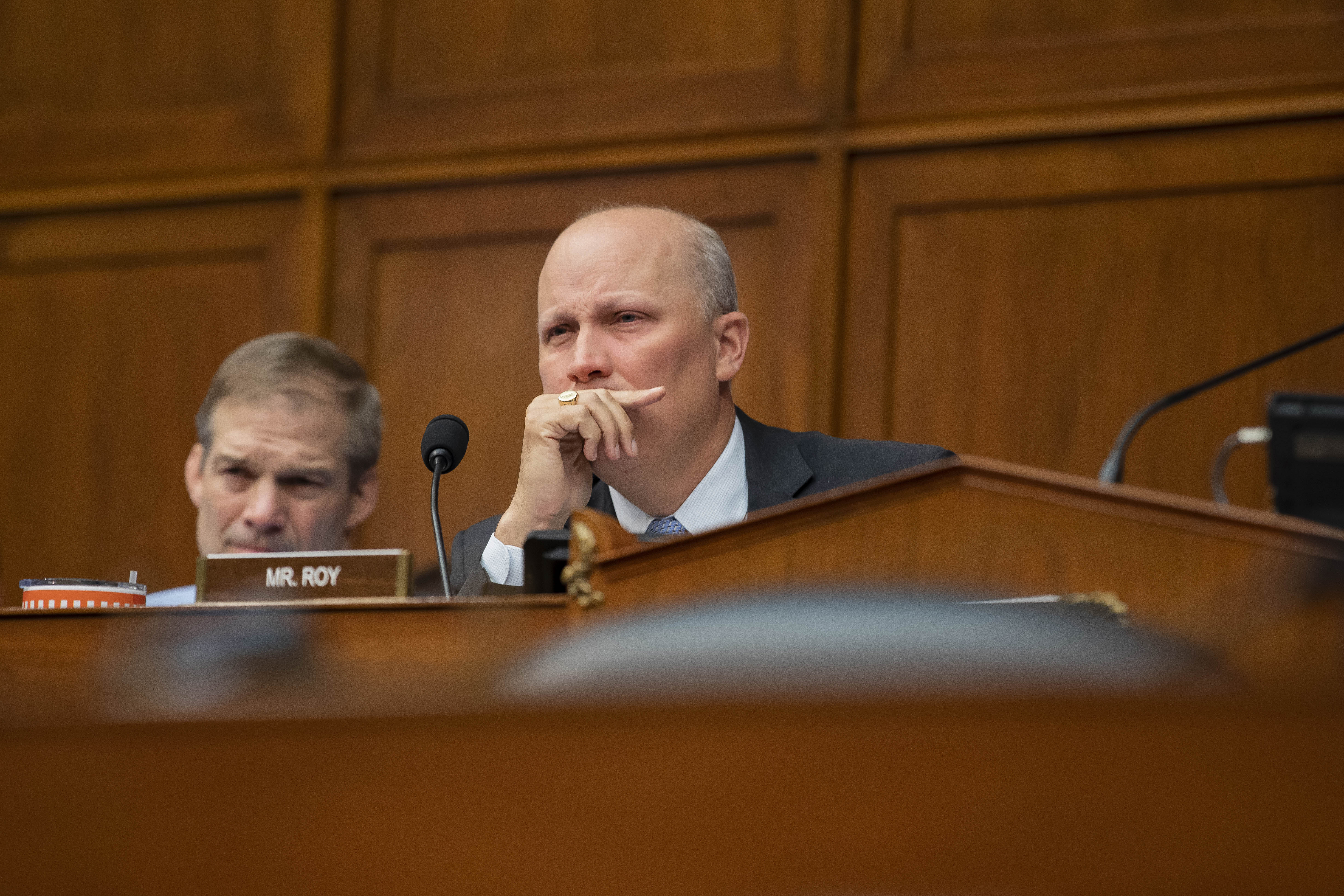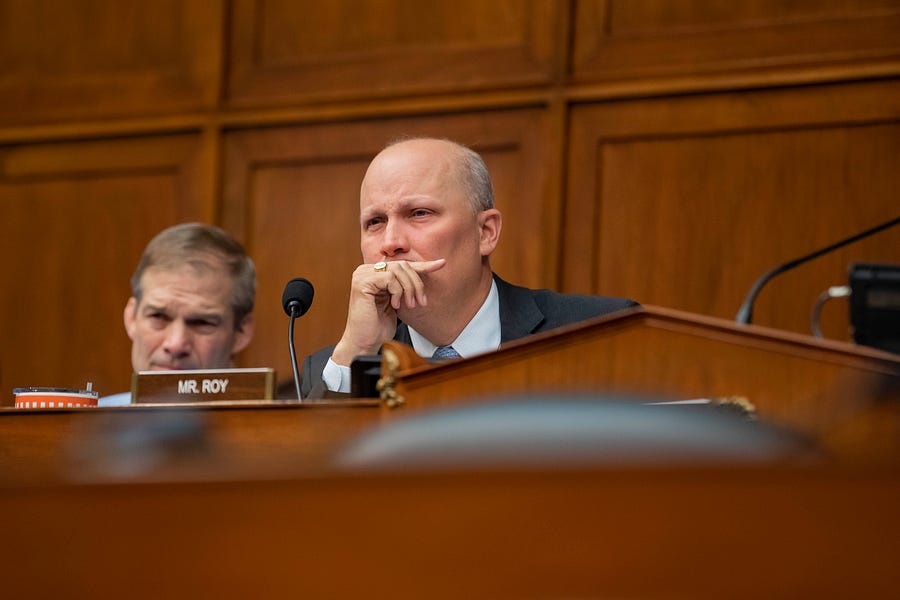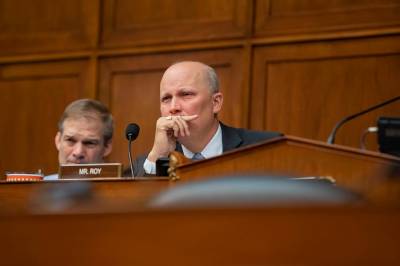Happy Wednesday! As of yesterday, the phrase “it is a terrible thing you are doing, but you will have to live with it, not I!” has now been uttered by a) one of your Morning Dispatchers when he was cut from his high school baseball team and b) the president of the United States in a letter to the speaker of the House objecting to his impeachment.
Quick Hits: What You Need to Know
The Foreign Intelligence Surveillance Court issued a tough statement in response to last week’s IG report. The FISC statement echoed the report’s concerns about the FBI’s reliability and requested an explanation as to how the bureau will remedy such mistakes.
Former Trump campaign aide Rick Gates was sentenced to 45 days in prison on Tuesday for financial conspiracy and lying to investigators. Gates provided information to assist Robert Mueller in his Russia investigation.
The Senate officially passed the National Defense Authorization Act on Tuesday, sending it to the White House for President Trump’s approval, which he is expected to give.
Boeing announced it would suspend production of its 737 Max planes next month. Federal regulators have not yet cleared the model to return to the skies after two deadly crashes in recent months.
Systems Failure

Today’s the day: This afternoon, barring some truly remarkable twist, the House of Representatives will vote to impeach Donald Trump. And after months of public and private hearings and non-stop media coverage, the day dawns pretty much exactly where we started: Democrats emphatically for impeachment, Republicans doggedly opposed.
We won't quarrel with the many people who point to impeachment an example of the current dysfunction of the federal government. They're right, for a variety of reasons. The evidence arrayed against President Trump is alarming, and too many Republican lawmakers are either pretending it does not exist or downplaying their concerns about his behavior—at least in public. Democrats argued that the gravity of the president’s offenses requires a serious and deliberate evaluation and then largely failed to provide one, rushing through a flawed and often partisan process to meet political deadlines.
But Tuesday brought another, equally troubling example of the current dysfunction, when the House revealed and summarily passed an enormous government spending package—two monstrous bills, 2,300 pages between them, to the tune of $1.4 trillion—less than 24 hours after lawmakers first got the chance to read it. The Senate is expected to matador it through and Trump is expected to sign it in plenty of time to avoid another government shutdown.
The president will likely do this despite his pledge in March 2018 to “never sign another bill like” the $1.3 trillion omnibus bill Congress had given him. Splitting the package into two bills was Congress’s way of getting around that threat. We wish we were kidding.
You Get a Wad of Cash! And You Get a Wad of Cash!
Like all good Frankenstein omnibus bills, this package has plenty in it to make anyone mad. For liberals, there’s the way it declines to touch the national emergency Trump declared on the U.S.-Mexico border last spring: a measure to restrict Trump’s ability to shift money to wall construction from funds allocated for other purposes didn’t make it into the final bill. For conservatives, there’s the millions of new funding for federal research on gun violence, the not-at-all-budget-related measure to raise the minimum age to purchase tobacco from 18 to 21, and—lest we forget—that eye-popping price tag.
“This one was different than the last few years’, because they just didn’t seem to say no to anything,” Brendan Buck, former counselor to then-House Speaker Paul Ryan, told The Dispatch. “There were, over the last few years, all kinds of times when people would come in to ask for some of the very same things that are included in this legislation, and we would just say ‘no’ because we didn’t want it to be loaded up like this.”
Small groups on both sides of the aisle condemned the package. Speaking to The Dispatch, several members of the House Freedom Caucus, which exists in large part to protest the budget-busting omnibus appropriations process, denounced what they described as congressional leadership using the threat of extending the session into the Christmas recess to force members to pass a bill they didn’t like.
“This is the point at which they have the maximum leverage,” said Rep. Chip Roy, pictured above. “If they waited until February or March, and you’re six months out from the end of the year, the amount of pressure they have to pass it in is a lot less than when you’ve got it looming right there before the Christmas holiday.”
Roy also railed against the way the package put a tiny group of leadership negotiators in charge of making sweeping changes to federal law and noted that states abandon principles of federalism for “debt-funded pork” from Washington. “We used to at least have a fight over it. Now we don’t even have a fight. Hell, we don’t even have a vote!”
Buck argues that there is plenty of blame to go around for the devolution of the process. “[Members of the Freedom Caucus] need to appreciate that they have played a role in getting to this point,” he said. “To have regular order appropriations, there just simply has to, especially in divided government, there has to be a bipartisan process. And if we do not allow that to happen at any stage, then it is inevitable that you’re going to end up with an omni. It’s just, there’s no other option. You have to appropriate, you have to fund the government. And if we are a no on everything, it is hard to have a functioning, transparent, open, deliberative system.”
It’s hard to pinpoint exactly what led us to this point—the buildup of partisan rancor raising the opportunity cost of each piece of legislation until must-pass bills became the only bills passed, a breakdown of lawmakers’ ability to make real compromises, the intoxicating allure of playing with Monopoly money, the eagerness to provide campaign-friendly goodies today while postponing payment for them indefinitely. But here’s the depressing bottom line: The system is broken beyond all reason, and it doesn’t appear there’s much of a chance of fixing it anytime soon.
“Not just entitlement spending, but discretionary spending also is essentially on autopilot,” Chris Edwards of the libertarian Cato Institute told The Dispatch. “Congress doesn’t scrutinize programs and trim those that are obsolete or lower-priority. Congress spends no time pruning the budget, just battling over which programs to increase the most.”
Loyalty For Me, But Not For Thee
One other point bears making here. As the president reneges on his promise not to roll along with the broken omnibus process, he reminds us of one of the most important lessons of his presidency: For Donald Trump, loyalty is a one-way street.
Throughout his impeachment fight, Trump has had no more ferocious defenders in the House than the members of the Freedom Caucus. Members like Mark Meadows and Jim Jordan—who declined to comment for this newsletter—have functioned as reliable attack dogs, fervently denying every suggestion of presidential wrongdoing, no matter how slight, while denouncing Trump’s Democratic opponents as craven and bitter partisans at every turn. Trump’s response to this has been to ignore them on their signature policy issue, the day before they go to bat for him at a critical impeachment vote. Trump treated another fierce ally, Lindsey Graham, in just the same way in October when he suddenly pulled U.S. forces out of northern Syria to allow Turkey to slaughter the Kurds.
This behavior might seem foolhardy—doesn’t he know how much he needs them? But Trump seems wise to the fact that, so far, they still need him more.
The testimony certainly bears this out. The Freedom Caucus members who spoke to The Dispatch were unanimous that the appropriations package was bad legislation—but only Roy seemed disappointed that “the president hasn’t made it a priority, and therefore it’s not a priority of those who are here on the Hill who are continuing to just perpetuate this shirts-versus-skins mentality of who gets power.” Others declined to comment or even, remarkably, suggested the president was merely being pragmatic:
“Yeah, I think [the president is] just looking at it realistically, knowing that if their proposal were going to pass, we would have just taken the White House’s budget and moved on it,” said Rep. Warren Davidson, who had earlier called the package a “horribly irresponsible” part of “the broken status-quo.” “Whether Republican or Democrat, [lawmakers are] basically dismissing the administration’s calls for more fiscal discipline, because some of these things are not politically palatable to Congress.”
It’s a reasonable case—but one it’s almost unimaginable to think of the Freedom Caucus making under another president.
Trump Tax Returns
Late last week, the Supreme Court agreed to decide whether President Trump can continue blocking the release of his financial records held by third parties.
The court granted certiorari—meaning at least four justices agreed to review lower court decisions—in three cases, involving the Manhattan District Attorney Cyrus Vance, the House Oversight and Reform Committees, and the House Financial Services and Intelligence Committees. Arguments for these cases will be held sometime in March of next year, likely setting up a decision to be announced in late June, just months before the 2020 election.
At a basic level, the three cases are very similar. All the plaintiffs sent subpoenas to third parties—the president’s accountants and/or banks—in an attempt to gain access to his financial records (the infamous tax returns!), the president sued to stop them, and every circuit court has ruled against him, with a notable dissent from Judge Naomi Rao, a Trump appointee on the D.C. Circuit.
There are some new legal issues here. In the Vance case out of New York, for example, Trump’s personal attorneys argued that the president is immune from all criminal proceedings while he is in office. The Department of Justice did not go quite that far, but instead argued that a state prosecutor needed to meet “a heightened showing of need for the information sought.” In the House cases, the president’s personal attorneys claimed the committees needed to present legitimate legislative interests—not law enforcement ones—to obtain the records.
So where is this headed?
Only four Supreme Court justices need to vote to take up a case, so it’s hard to guess exactly how this went down. But it’s a fair bet that Justice Roberts, ever the institutionalist and court historian, is mindful of the precedents set during the Nixon (the tapes!) and Clinton (Paula Jones!) administrations. The court sided unanimously against the president in both of those cases, preventing the commander in chief from claiming some form of immunity by virtue of their office.
Roberts would almost certainly prefer another unanimous decision. But in the absence of one, he’d likely be the swing vote. And that may be bad news for Trump.
TV Debating: Not All It’s Cracked Up to Be?
As the 2020 Democratic primary race revved up over the second half of 2019, the regular events that grounded the candidates’ media coverage were the debates—who had qualified for them, who won them, and so on. But as candidates prepare to take the stage at Loyola Marymount University in California for this month’s debate tomorrow tonight, all the conversation has been over who didn’t make the cut—or who nearly didn’t show up anyway.
The most immediate and pressing trouble this week was the fact that employees at Loyola Marymount were on strike and picketing at the campus. For the candidates, all of whom are charging hard after the labor vote, crossing a picket line just to get some TV time would have been the kiss of death: All seven who had qualified threatened to bail if the strike was not resolved in time. But the DNC swooped in and helped things get settled amicably in time for the event to proceed. A toast to the good people of Loyola Marymount: You never know when fortune will smile down upon you in the form of a frazzled Tom Perez waving around a checkbook.
With that settled, the conversation turns back toward another absentee: Sen. Cory Booker, who after Kamala Harris’s unexpected exit from the race earlier this month is now the most viable African-American candidate running. Booker has worked hard to capitalize on Democrats’ sudden horror at finding themselves stuck with such a white stage—Andrew Yang is the only nonwhite candidate to have qualified.
The exposure is a godsend for Booker, who has struggled to break through nationally despite his reputation as a rising star in D.C. Whether Booker can ride the wave to a stronger showing in the next round of polls remains to be seen. Regardless, it’s interesting that this time, at least, the candidates driving the most buzz pre-debate are the ones outside looking in.
Worth Your Time
In this essay for the Heritage Foundation, executive vice president Kim Holmes lays out what he sees as the problems with nationalism on the right: “The best way, in my opinion, to protect America's greatness, its special claims, its identity if you will, is to believe in what made us great in the first place. It wasn't our language. It wasn't our race. It wasn't our ethnicity. It wasn't our industrial policy. It wasn't the power of government to decide what the trade-offs are. It wasn't in a government that decides what kind of work is dignified or what kind of work is not. And it certainly wasn't a belief in the nation-state or the greatness of nationalism.”
There are candidate profiles, and then there’s Ruby Cramer’s Bernie Sanders profile for Buzzfeed News. In it, she tells the story of how Sanders has become almost a bystander to his own campaign, preferring to let his supporters share their stories with each other.
In The Atlantic, history professor Tim Naftali looks at a recently unearthed diary from Barber Conable, the fourth-ranking House Republican during the Nixon Watergate era, and details how a plan to demand the president’s resignation fell through: “Political courage turns out to have been as rare in 1974 as it has proved to be in 2019.”
At Vox, Kyle Chayka explains monoculture—a “range of artifacts, characters, voices, and stories that a specific demographic ... find recognizable and relatable”—and asks if, in the age of streaming, we’re coming to the end of it. “Linear TV gave us a monocultural feeling because we knew millions, tens of millions, of other people were watching the same channel as us at the same time, though we couldn’t see them.”
Presented Without Comment
Something Fun
Fans of antiquated comic strips rejoice! Although some of the authors of The Morning Dispatch may not have been born when Gary Larson published his final Far Side cartoon, we read compilations of them at our local libraries growing up and are ecstatic to see he has returned. The new Far Side website will feature “The Daily Dose, an ever-changing, random selection of cartoons,” as well as comic collections that “offer a different themed collection of his classic cartoons updated weekly.”
Shoot us an email with your favorite Far Side if you’ve got one. Here’s one of ours:
Toeing the Company Line
In David’s most recent French Press, he discusses the perils of right-wing populism cozying up with racists and ruminates on Peggy Orenstein’s cover story for The Atlantic about boyhood in America. Give it a read here!
Let Us Know
What else should Congress have thrown into the non-omnibus-omnibus, since apparently money was no object?
$150 for Jim Jordan, so he can go get a suit jacket to wear on the House floor during hearings.
$20 million for the Ricketts family so the Cubs can stop trying to trade away Kris Bryant, the third most valuable position player in baseball since 2015.
$5 billion for this new anti-Trump super PAC , because what’s another $5 billion lit on fire at this point, right?
$300 for chairs at The Dispatch HQ so neither of your Morning Dispatchers has to sit on the floor.
$100 million for a papal ninja army to guard the Vatican (Jonah has been banging the drum on this for a while).
Reporting by Declan Garvey, Andrew Egger, Sarah Isgur, and Steve Hayes.
Photograph of Chip Roy, R-Texas, by Anna Moneymaker/Getty Images.







Please note that we at The Dispatch hold ourselves, our work, and our commenters to a higher standard than other places on the internet. We welcome comments that foster genuine debate or discussion—including comments critical of us or our work—but responses that include ad hominem attacks on fellow Dispatch members or are intended to stoke fear and anger may be moderated.
With your membership, you only have the ability to comment on The Morning Dispatch articles. Consider upgrading to join the conversation everywhere.